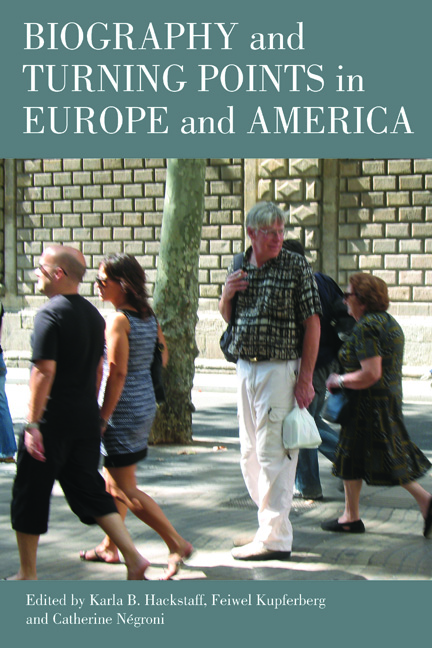Book contents
- Frontmatter
- Contents
- Notes on contributors
- Introduction: Advancing the dialogue on turning points
- one Unpacking biographical narratives: investigating stories of artistic careers in Northern Jutland, Denmark
- two Turning points in the life course: a narrative concept in professional bifurcations
- three Conjugal separation and immigration in the life course of immigrant single mothers in Québec
- four Migration biography and ethnic identity: on the discontinuity of biographical experience and how turning points affect the ethnicisation of biography
- five Biographical structuring through a critical life event: parental loss during childhood
- six Decisive turning points in life trajectories of violence among young men in the barrios of Caracas: the initiation and biographical reconversion to non-violent lifestyles
- seven The turning points of the single life course in Budapest, Hungary
- eight Complicating actions and complicated lives: raising questions about narrative theory through an exploration of lesbian lives
- nine Religious conversion as a biographical turn/ing: the case of Orthodox believers in contemporary Russia
- ten Conclusion: theorising turning points and decoding narratives
- Index
two - Turning points in the life course: a narrative concept in professional bifurcations
Published online by Cambridge University Press: 01 September 2022
- Frontmatter
- Contents
- Notes on contributors
- Introduction: Advancing the dialogue on turning points
- one Unpacking biographical narratives: investigating stories of artistic careers in Northern Jutland, Denmark
- two Turning points in the life course: a narrative concept in professional bifurcations
- three Conjugal separation and immigration in the life course of immigrant single mothers in Québec
- four Migration biography and ethnic identity: on the discontinuity of biographical experience and how turning points affect the ethnicisation of biography
- five Biographical structuring through a critical life event: parental loss during childhood
- six Decisive turning points in life trajectories of violence among young men in the barrios of Caracas: the initiation and biographical reconversion to non-violent lifestyles
- seven The turning points of the single life course in Budapest, Hungary
- eight Complicating actions and complicated lives: raising questions about narrative theory through an exploration of lesbian lives
- nine Religious conversion as a biographical turn/ing: the case of Orthodox believers in contemporary Russia
- ten Conclusion: theorising turning points and decoding narratives
- Index
Summary
Introduction
In this chapter I examine how the turning point concept is defined in academic literature and its use in the life course field. While the main tendency in social sciences is to ignore the concept of the turning point, some researchers are keen to study the concept in greater detail and to try to give it a theoretical status.
My interest in this concept took shape in my research on voluntary professional change and by my participation in a broad debate on this concept initiated at the 2003 conference, ‘Bifurcations and Events’, highlighting a number of major changes in postmodern society and their implications for institutions, history and biography. Many different explanations have been put forward, each giving rise to various terms with similar meanings, such as ‘turning points’ (Hughes, 1958; Abbott, 2001), ‘revolutions’ (Kuhn, 1962), ‘events’ (Sewell, 1996) and ‘bifurcations’ (Balandier, 1998). As I observed at the 2003 conference, the turning point concept has been addressed within a variety of disciplinary fields (history, economics and sociology) and at various scalar levels, from macro to micro.
I would like to focus on the concept of the ‘turning point’ by examining the advances made in the theoretical field before going on to detail my own findings based on empirical research. I propose to approach the turning point concept by reviewing the current literature on the subject, as produced by major researchers in the field of sociology, and to outline a theoretical explanation of the turning point concept and the empirical work performed in various fields.
With this in mind, this chapter is organised into three sections. First, I provide an overview of the theoretical concept of the turning point. This is necessary because there is no common definition. I then relate it to the notion of bifurcation. Does the concept of turning point embody bifurcation itself, or is it described as a nebulous process that is not clearly perceived and which leads to bifurcation, or is it an event that marks an epoch or allows a person to turn the page (Leclerc-Olive, 1997)? Based on an analysis of these authors, as set out below, a turning point is understood as a result of bifurcation, a decision-making process, and as an analysis of bifurcation.
- Type
- Chapter
- Information
- Biography and Turning Points in Europe and America , pp. 41 - 64Publisher: Bristol University PressPrint publication year: 2012

